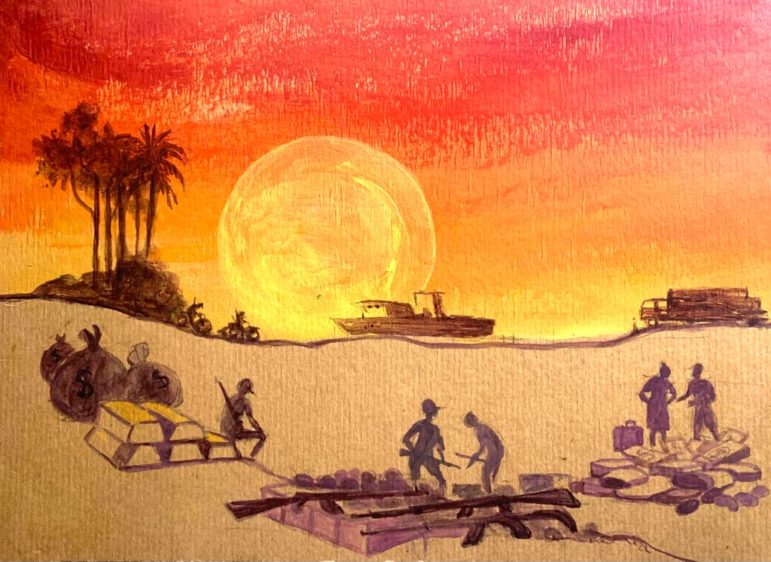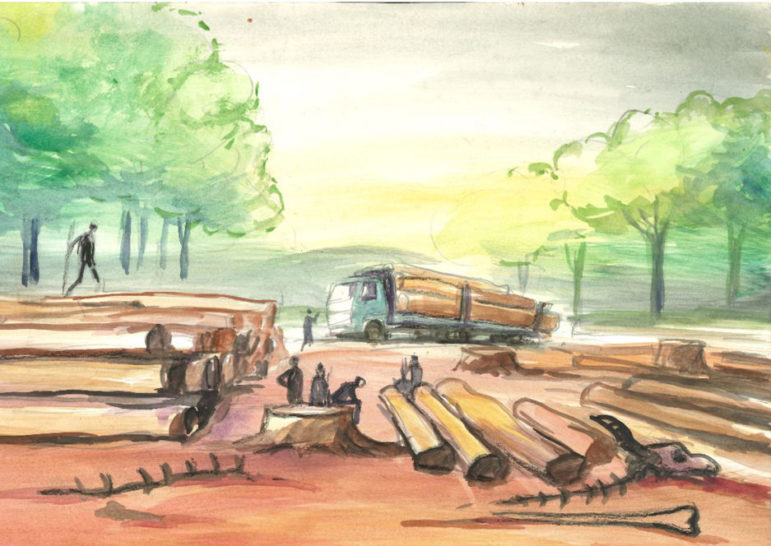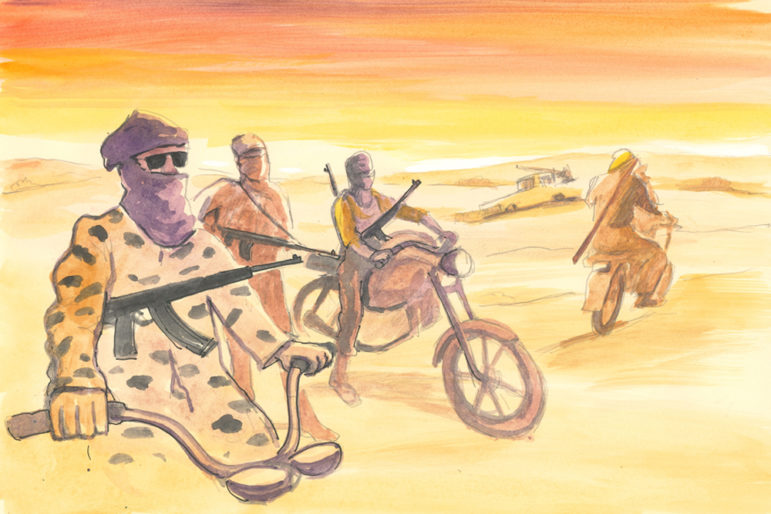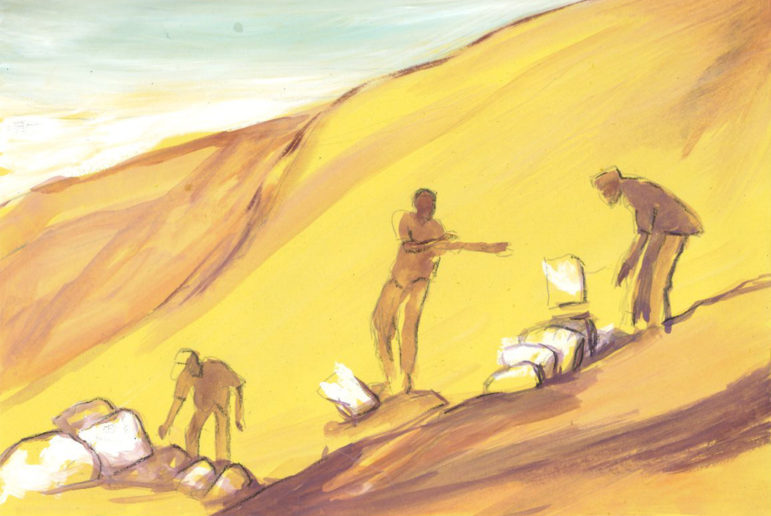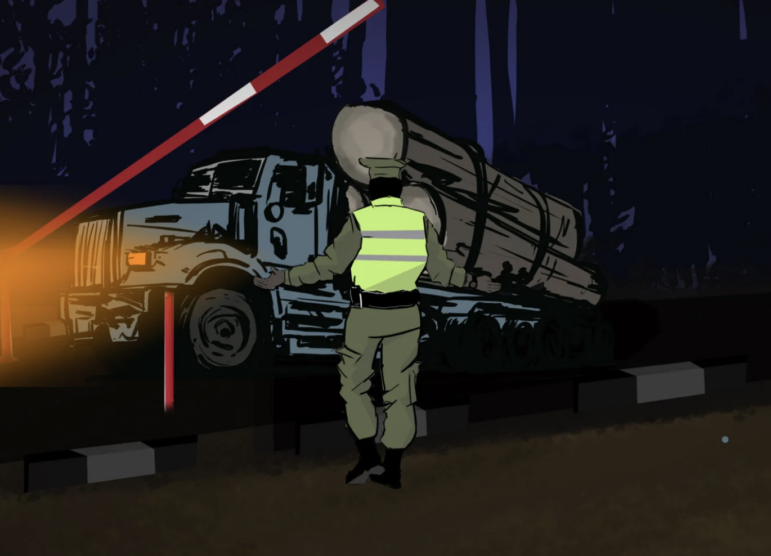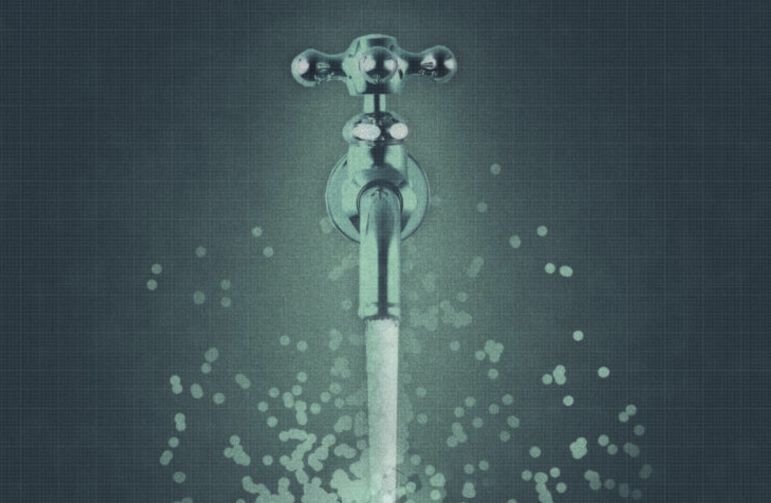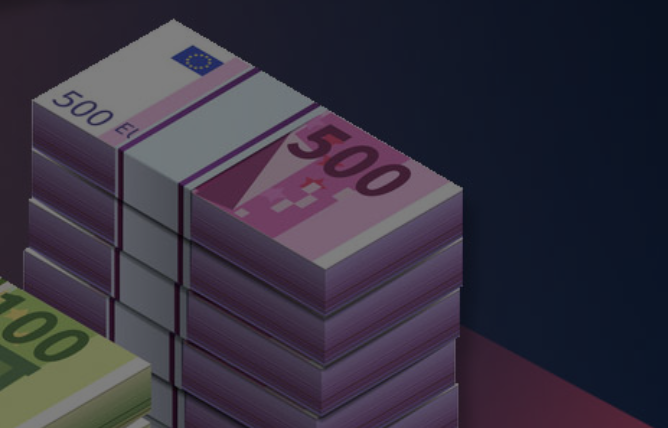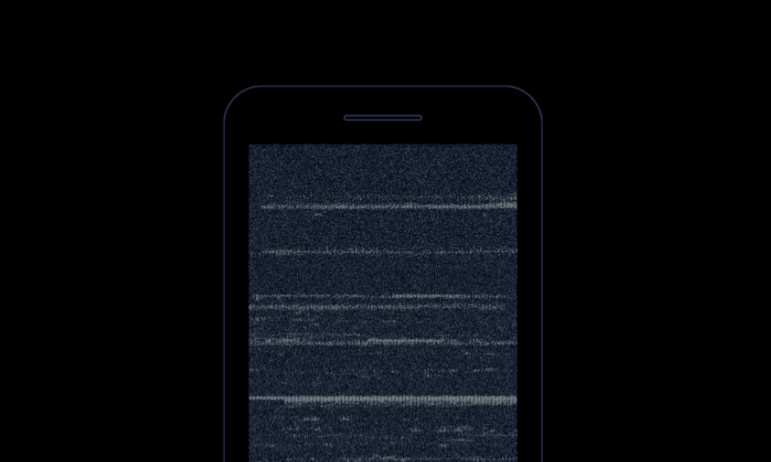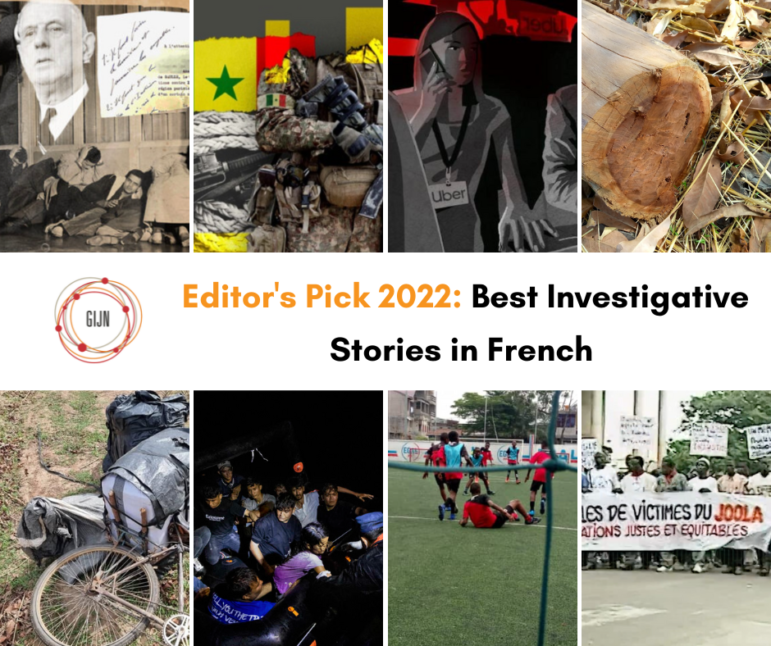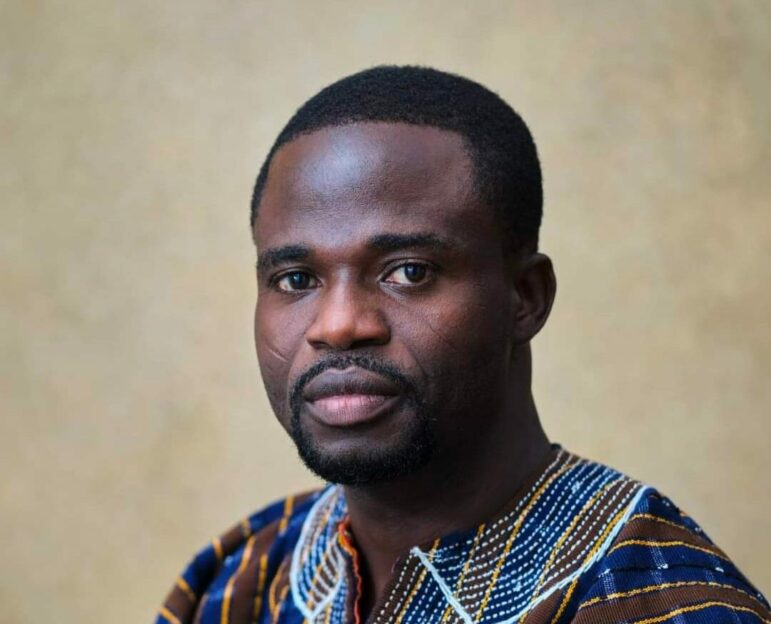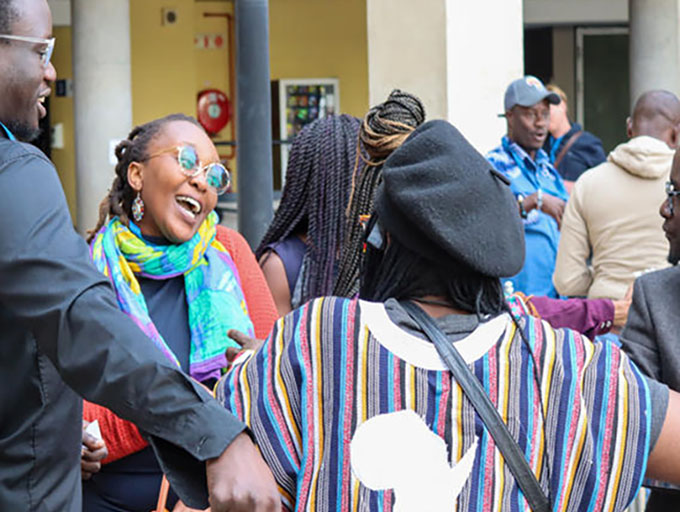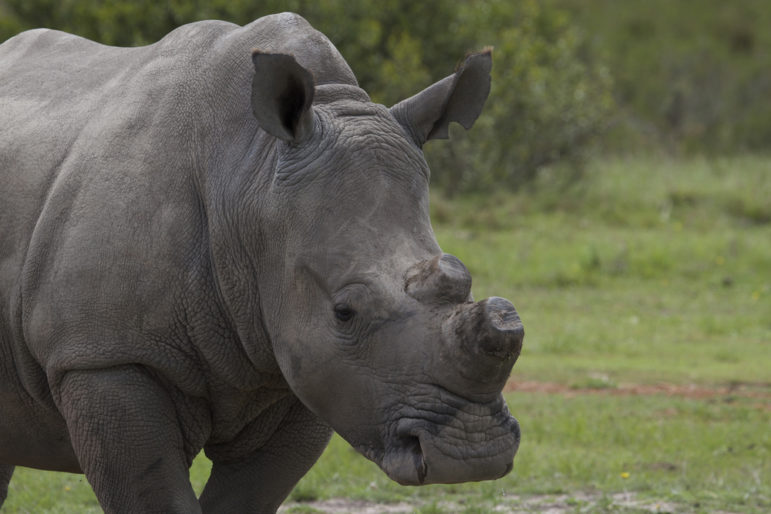

Image: GIJN
Forever Pollution Sites, Mass Killing of Civilians, African Timber Trafficking: 2023’s Best Investigative Stories in French
Read this article in
This year, cooperation has been king. In this selection of the year’s best investigations in French, most are various forms of collaborative journalism — be it across regions, media, or reaching beyond journalism to work with scientists. All demonstrate the potentially increased scope and impact of investigations that are the fruit of collaboration. Certain themes also stand out this year: stories covering natural resources, pollution, or environmental crime; examinations of companies and business practices; and investigations into both historic and topical incidents of child sexual exploitation.
From Cameroon to Canada, from Tunis to Paris, read about the eight stories that caught the attention of our French-speaking GIJN team this year, which includes Alcyone Wemaëre (French editor), Maxime Domegni (Francophone Africa editor), and Aïssatou Fofana (Francophone Africa assistant editor). Merci!
Timber Trafficking in Cameroon
In Cameroon, where journalists routinely face the risk of abduction, torture, and killing, two brave investigative journalists teamed up to conduct a 12-month investigation into one of the most dangerous beats for journalists: environmental crime.
Josiane Kouagheu and Madeleine Ngeunga investigated illegal timber trafficking in the Cameroonian part of the Congo Basin rainforest — part of the world’s second largest tropical forest after the Amazon. They collected and analyzed various data and documented criminal activities that in some cases implicate high-ranking military officers.
This Pulitzer Center-supported investigation, a collaboration between InfoCongo, a Congo Basin-focused journalism and data platform, and French newspaper Le Monde, produced a series of seven investigations published in both outlets. Their findings also prompted a rare public reaction from Cameroon’s government, which called for more rigorous control of the sector.
The Forever Pollution Project
The Forever Pollution project is an innovative collaboration between journalists and scientists, with the latter functioning as a form of peer review for the journalists’ findings. Initiated by Le Monde and involving no fewer than 18 European newsrooms, it shows for the first time the true scope of Europe’s contamination with per- and poly-fluoroalkyl substances (PFAS), also known as forever chemicals, compounds that are both ultra-toxic and persistent — some take 1,000 years to degrade.
Project team members used roughly 100 datasets, dozens of FOIA requests, and methodology developed by US scientists to produce a database and map of PFAS contamination sites in Europe — which according to the project, number around 40,000. (Read more about the methodology here). The project was supported by Journalismfund.eu, Investigative Journalism for Europe (IJ4EU), and Arena for Journalism in Europe.
The impact of the investigation is still unfolding, but includes scientists referring to the database for research papers and the team being invited to present its findings to the UN Food and Agriculture Organisation (FAO) and the European Commission. In November, the Investigation program on Belgian public broadcaster, RTBF, revealed new contamination sites in Belgium. The project was also a finalist for the 2023 Daphne Caruana Galizia Prize. (Read more about this investigation’s dedicated GIJC23 session.)
The System: Women Come Forward in Quebec
For this investigation, which appeared in English on CBC’s television network and in French on Radio-Canada’s investigative program, Enquête, journalists spent nearly a year collecting testimonies from 12 women who claim they received money and gifts in exchange for sex — some of them while they were still minors — from one of the wealthiest men in Quebec. The women spoke of a sophisticated system of recruiting girls and young women, spanning from 1992 to 2006. The reporters also obtained court documents and spoke to numerous sources to corroborate details for incidents reaching back nearly three decades. None of the women interviewed agreed to be identified.
In February, a Canadian law group filed a class action lawsuit against the individual and his company for alleged sexual exploitation; the group claims that more than 30 women have joined the class action and that more continue to come forward. However, the class action is yet to be authorized by a judge. A separate lawsuit filed by one of the alleged victims is ongoing. The individual denies all allegations.
Mapping ‘Authorized’ Deforestation
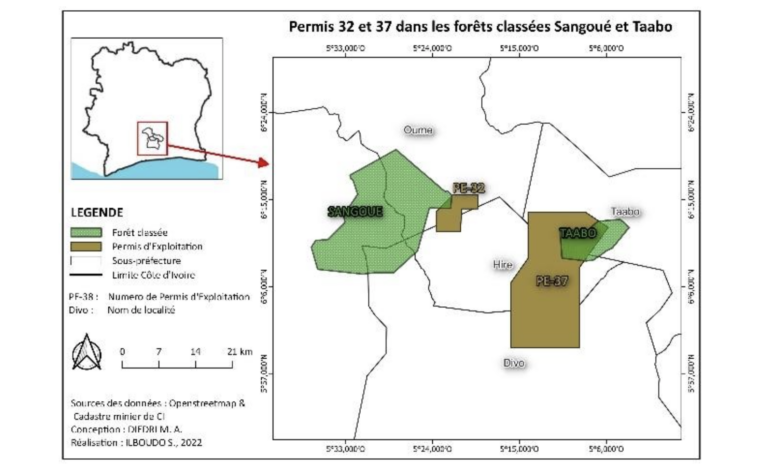
Graphic showing mining permits (in brown) adjacent to, and encroaching on, two protected forests in Côte d’Ivoire. Image: Screenshot, CENOZO
In Côte d’Ivoire, the world’s leading cocoa producer, agriculture is recognized as the primary source of deforestation. But there is another, generally overlooked player: mining. This is one of the discoveries of a collaborative investigation between two journalists from West African investigative hub CENOZO, from Cote d’Ivoire and its northern neighbor Mali, which faces similar issues.
The two journalists made innovative use of national mining cadastral data (the official documentation of information relating to parcels of land, such as value and quantity), cross-referenced it with satellite data, and discovered how mining permits are nonetheless issued for protected areas and how mining operations encroach on them. The pair then turned to the Global Forest Watch platform to assess the impact of these human activities on forest areas over the years.
Children Killed in Burkina Faso
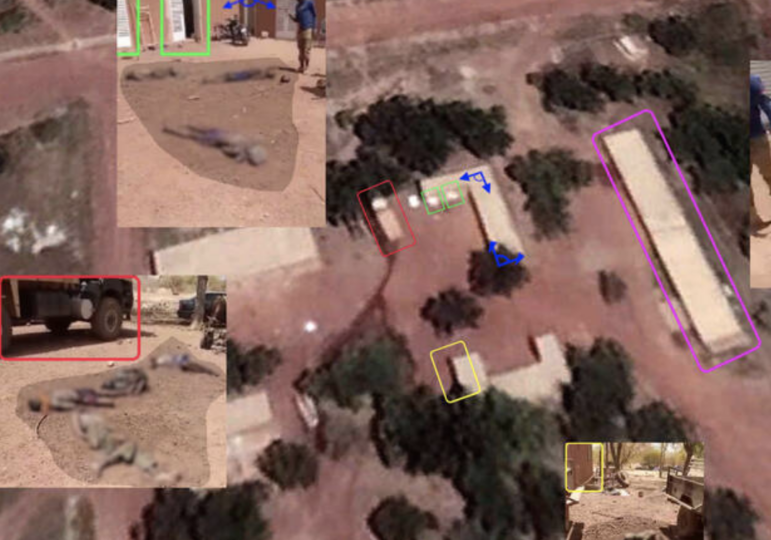
Satellite image of a military camp in Burkina Faso suspected of being the site of a mass killing of civilians. Image: Screenshot, Líberation
In February 2023, a journalist at the French newspaper Líberation received a video recording showing a group of men, some in military fatigues, standing around what appear to be the bodies of seven children and adolescents. It’s unclear how they were killed, but one part of the video shows a man striking one of them on the head with a heavy stone.
Líberation spent a month investigating the footage. Thanks to open source methods they were able to trace the date, time of day, the people, and the location — a military camp northwest of Ouahigouya in the north of Burkina Faso near its border with Mali, a region where the defense forces have been fighting jihadist terrorist groups. In addition to working off visible details such as vehicles and army insignia, they were able to match even brief glimpses of building elements in the video to satellite images of the army camp; with the application SunCalc, which reproduces the path of the sun — and therefore shadows — according to the time of year, time of day, and geographical location also produced a match for the camp.
As various jihadist groups have stepped up their activities in the region, Burkina Faso’s defense forces have been supplemented by tens of thousands of volunteer fighters, who have been accused of rounding up anyone they suspect of extremist ties and the extrajudicial killings of civilians. The Fulani, an ethnic minority group heavily displaced by the fighting — and from which jihadists recruit — have increasingly been targeted. According to Libération, the Burkinabe government and president did not wish to comment or respond to questions. Subsequent media reports on the incident, such as this AP article published the following week, note that Burkina Faso’s military has denied responsibility.
Abu Dhabi Secrets
This multipart, Europe-wide collaboration began with the hack and leak of millions of documents from a Geneva-based private intelligence company. According to the investigation, between 2017 and 2021 individuals connected to the United Arab Emirates had paid the company millions of euros for conducting investigations, destabilizing operations, or smearing the reputation of imagined enemies of the UAE — in particular, those who had business or other links with Qatar.
French investigative news site Mediapart obtained a portion of the leaked data and shared it with the European Investigative Collaborations (EIC) network. Reporters from Mediapart, along with 13 EIC members including Swiss online outlet Heidi News and Swiss public broadcaster Radio Télévision Suisse, verified and analyzed thousands of files, which included details of clients, supposed opponents, and payments made to journalists. The findings were published in multiple articles in various outlets across Europe. (An earlier article in The New Yorker, also referring to the hacked files, explored one particular case in which the agency ruined the business and reputation of an American commodities trader.)
The affair raises crucial questions about the novel dangers of private intelligence operatives working on behalf of foreign states or authoritarian rulers — with no regulations or accountability. The UAE’s Paris embassy and the founder of the intelligence company did not respond to Mediapart’s request for comment. The individual’s lawyers told Mediapart that the documents used for the investigation had been obtained unlawfully.
Investigating the Lucrative Visa Business
Tunisian investigative newsroom — and GIJN member — Inkyfada examined a multinational company that provides visa and consular services on behalf of European governments, managing the administration of visa applications at more than 100 centers all over the world. Millions of Schengen visas are processed through private companies such as this one, which have proliferated in the last 15 years as consulates have increasingly outsourced these services.
This investigation into the structure of the enterprise, whose parent company is headquartered and listed in France, is based on analysis of financial statements, annual reports, meeting minutes, and other administrative documents related to alleged profit shifting and tax optimization methods. Supported by data, documents, organizational charts, and graphics, Inkyfada explains how, by shifting revenue through various subsidiaries and intermediaries registered in Luxembourg, the parent company can end up paying less than 1% tax on millions of euros in profit.
Inkyfada contacted several European consulates that employ the services of the company’s Tunisia-based center for comment on the practices of the parent company. They declined to comment or stated that their relationship was limited to the Tunisian entity.
Online Sexual Exploitation
The live streaming of sexual acts performed on minors, watched online by Europeans tens of thousands of miles away, is a growing phenomenon that proliferated during the COVID-19 pandemic, notes Le Monde. According to a report by the International Justice Mission (IJM), incidents of OSEC (online sexual exploitation of children) occur eight times more frequently in the Philippines than in other countries where these activities have been reported, such as Brazil, Mexico, and India. The IJM report also states that in 41% of cases, the rapes are committed by biological parents, and in 42% by close relatives — who turn to it as a source of income. But Le Monde journalists point out that this practice is the result of a demand — Europeans making requests for certain content online.
The team reported on international law enforcement efforts, including the criminal trial of several individuals in Europe, and on the ground in the Philippines, where they spent time with sources who protect and rehome children rescued from these situations — and when possible, document their experiences. These children’s accounts are crucial to the efforts of European, American, and Filipino law enforcement as they try to develop legal procedures to combat OSEC — an immense challenge because live streams are not usually recorded, which means that finding concrete evidence is difficult.
The investigation — a partnership between Le Monde, which published a three-part series, and European public service channel Arte, which produced a video report — was shortlisted for the DIG Awards and the Albert Londres Prize, France’s highest journalism award.
 Maxime Domegni is GIJN’s Francophone Africa editor and an award-winning journalist with years of experience in investigative journalism. He has worked, among others, as editor-in-chief of the Togolese investigative newspaper L’Alternative. He has also collaborated with different media organizations, notably with the Swiss-based Fondation Hirondelle as West African Correspondent for the justiceinfo.net website.
Maxime Domegni is GIJN’s Francophone Africa editor and an award-winning journalist with years of experience in investigative journalism. He has worked, among others, as editor-in-chief of the Togolese investigative newspaper L’Alternative. He has also collaborated with different media organizations, notably with the Swiss-based Fondation Hirondelle as West African Correspondent for the justiceinfo.net website.
 Aïssatou Fofana is assistant editor for the GIJN Afrique program. She is based in Abidjan, Côte d’Ivoire, and is also a communications specialist, blogger, and freelance journalist with a strong background in environmental journalism. As a media entrepreneur, she recently co-founded an online media outlet, L’écologiste, to amplify environmental information.
Aïssatou Fofana is assistant editor for the GIJN Afrique program. She is based in Abidjan, Côte d’Ivoire, and is also a communications specialist, blogger, and freelance journalist with a strong background in environmental journalism. As a media entrepreneur, she recently co-founded an online media outlet, L’écologiste, to amplify environmental information.
 Alcyone Wemaëre is GIJN’s French editor and a freelance journalist based in Lyon. She is a former staff reporter for Europe1 and France24 in Paris. She is also an associate professor at Sciences Po Lyon, where she is co-responsible for the Data and Investigation specialty for the Master’s degree in journalism, created with CFJ. Alcyone graduated from Celsa and received the François Chalais Prize. Her work has also appeared in Le Monde, Slate, Infomigrants, La Chronique, L’Obs, and Le Temps.
Alcyone Wemaëre is GIJN’s French editor and a freelance journalist based in Lyon. She is a former staff reporter for Europe1 and France24 in Paris. She is also an associate professor at Sciences Po Lyon, where she is co-responsible for the Data and Investigation specialty for the Master’s degree in journalism, created with CFJ. Alcyone graduated from Celsa and received the François Chalais Prize. Her work has also appeared in Le Monde, Slate, Infomigrants, La Chronique, L’Obs, and Le Temps.

